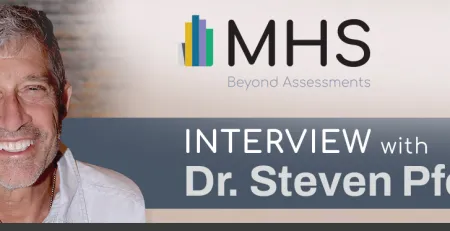Navigating the Transition to Digital Assessments
As the evolution of assessment best practices continues, the surge in professionals embracing digital assessments is driven by efficiency, accuracy, and convenience. These tools offer streamlined administration, standardized processes, and the ability to provide tailored, engaging assessments while facilitating remote services and data-driven decision-making.
However, some clinicians and school psychologists are reluctant to fully adopt digital assessments, often stemming from apprehensions related to data privacy, technological learning curves, and the accessibility of digital technologies.
MHS’ Clinical and Education assessment consultants, Jodi Kennis and Denise Cable discuss the benefits of moving to digital assessments and dispel myths around some of the psychology community’s common concerns.
This interview has been edited for length and clarity.
Let’s talk about the elephant in the room when it comes to assessing patients and students through digital administration. Some psychologists are concerned about data privacy. Can you speak to how MHS handles customer data?
DENISE: As the first publisher to digitize assessments, MHS takes the utmost care with data security. After 40 years of service to our customers, we understand the sensitivity and privacy required in our work, and because of this, we have established a Digital Trust.
MHS’ Trust Framework was created to articulate and share our commitment to trusted relationships with our clients, partners, industry regulators, and the users of our measurement and test systems. This framework includes ethics, stewardship, transparency, and data accountability. MHS has earned and maintains some of the highest certifications, which show our commitment to you and our work, including ISO/IEC 27001:2013, SOC 2, FERPA Certification, CCPA/CSPC Compliance, and others.
Certifications and compliance standards are vital for customers when selecting an assessment publisher because they assure data security and privacy, demonstrate legal compliance, reduce risks, and enhance trust. Choosing a publisher with these credentials can significantly safeguard customer data and ensure the overall quality of assessment services. MHS regularly reviews and updates our platforms and systems to ensure data security so we can adapt to ever-evolving digital threats and improve upon regulatory standards.
Learn more about MHS’ Digital Trust here.
View MHS’ Compliance documentation here.
Read more about MHS’ Privacy Policy here.
Another concern some psychologists share is that internet and computer access may not be accessible for everyone they see in their practice or schools. How does digital assessment work in cases like this?
JODI AND DENISE: It’s true that there are barriers to technological access for some examinees. Because of this, in addition to allowing an examiner to send links to raters through a secure email portal via the MHS Online Assessment Center+ (MAC+), MHS also allows examiners to deliver assessments to their raters live on a device or by printing forms to distribute to raters. Forms can be distributed in advance of an examination or while raters are present. Examiners can then enter the rater’s responses for electronic scoring and reporting online, allowing for greater accuracy and efficiency. This option is particularly helpful for raters who don’t have computer or internet access as they can still complete the printed form pen and paper style and return it to the examiner.
Another great feature of this administration option is that the MAC+ portal does not deduct inventory until the assessment report is generated. So, in the event something prevents a rater from returning the form, that form will remain an available part of the examiner’s inventory.
Digital assessment has shown to be more accurate and efficient than traditional paper administration. Given that better accuracy and efficiency will enhance outcomes, how difficult is the transition to assessing digitally with MHS tools?
JODI: With the help of the MHS Online Assessment Center “Getting Started Guide,” recorded demonstration webinars, and assistance from MHS Team members, the transition to the online portal is smooth and seamless. The Getting Started Guide is located on the home page of each user’s account and walks you through each step of each process in the portal.
Learn more about the MHS Online Assessment Center+ here.
For individuals who might be more inclined to stick with more traditional paper assessments, what would be a good first step in exploring a transition to digital?
JODI AND DENISE: Change can be difficult, especially when introducing something new to an entire department. Here are a few tips to get started:
- Identify your goals and needs: Start by clearly defining your objectives for transitioning to digital assessments. What specific benefits are you hoping to achieve? For example, are you looking to streamline the assessment process, reduce administrative overhead, or enhance the student/patient experience? Consider the needs and preferences of your target audience (students, patients, educators, etc.) and how digital assessments can better meet those needs.
- Start small: Consider small-scale trials instead of immediately transitioning all assessments to digital formats. Choose a specific department or group of patients/students to work with initially. This allows you to gain experience, test the selected tool’s effectiveness, and identify any challenges or adjustments needed.
- Get training: Ensure that staff, educators, or clinicians in the transition receive adequate training on digital assessment tools. MHS offers easy-to-follow guides to help you get started quickly with the MAC+ portal!
Remember that the transition to digital assessments can be a gradual process, and it’s essential to be flexible and adapt to the specific needs and challenges of your organization or educational institution. Start small, learn from your experiences, and refine your approach to achieve your desired outcomes.
Can you share direct feedback you’ve received from those who have made the leap to digital assessment?
JODI AND DENISE: We love hearing from customers! It’s especially helpful when we talk to clients who have embraced digital assessments. Our customers have praised the user-friendliness of MAC+ and expressed their own and their team’s satisfaction with it. Users appreciate the responsive support and the convenience of accessing assessments from anywhere without the hassle of paper. Many users also find it efficient to have all their assessment resources easily accessible, eliminating the need for time-consuming file searches. We look forward to receiving more feedback in the future, one of the best parts about being digital is that we can more easily adjust and improve our platforms and systems. We built the MAC+ with feedback and insight from our users to begin with!
Have more questions about MAC+ or assessing digitally? Get in touch with a member of our team today.










